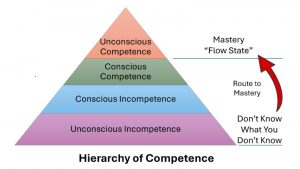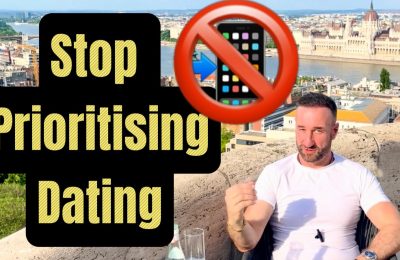We all want to grow, develop, and get better at the things that matter to us. But when it comes to mastering new skills, most people hit a wall. If you’ve ever wondered why your progress stalls—or worse, never starts—you’re not alone. Many of us struggle with the same invisible barriers. But here’s the truth: You don’t know what you don’t know.
There’s a proven psychological model that explains exactly why this happens, and more importantly, how to overcome it. It’s called the Four Stages of Competence, and it holds the key to mastering any skill—whether it’s public speaking, building a business, learning a language, or even Brazilian jiu-jitsu.
Originally developed by Noel Burch in the 1970s while working at Gordon Training International, the Four Stages of Competence have since been adopted and referenced in various educational and psychological studies, including work published by the National Institutes of Health (NIH) and frameworks referenced by the University of Illinois and Harvard Business Review. This model remains a core concept in skill acquisition and behavioural learning theory.
The Four Stages of Competence: A Roadmap for Mastery

Before you can master anything, you need to understand where you are on the journey. The Four Stages of Competence are:
- Unconscious Incompetence – You don’t know how little you know. You’re unaware of your lack of skill.
- Conscious Incompetence – You become painfully aware of what you don’t know. This is where most people give up.
- Conscious Competence – You start to get it. You can do the skill, but only with focus and effort.
- Unconscious Competence – You’ve mastered it. The skill becomes second nature, like muscle memory.
Mastering new skills means moving intentionally through these four stages, and embracing each one.
Educational institutions, including the University of Illinois and Stanford University, have integrated this model into learning development courses, reinforcing its effectiveness across diverse domains, from classroom learning to executive leadership training.
Real Talk: What’s Really Holding You Back?
Let’s break it down. Here are the most common reasons people struggle to make progress:
1. Overconfidence in Stage One
We often dive into something new thinking, “How hard can it be?” Whether it’s crypto trading, marketing, or playing piano, we assume it’s just a matter of time. But unconscious incompetence is dangerous because you’re blind to the challenges ahead.
2. The Discomfort of Stage Two
This is the stage where most people quit. You’ve started learning and suddenly realise, “Wow, I’m terrible at this.” It’s humbling—and sometimes embarrassing. The truth is, this stage requires grit. But if you push through it, you’re already ahead of most.
3. Refusing to Be a Student Again
Too many people avoid learning because they don’t want to be seen as beginners. But if you want to be great at anything, you must be willing to be a novice. Stay teachable. Embrace the awkward, messy part of the process.
4. Being an Armchair Expert
Watching YouTube videos or reading books isn’t enough. It’s the practice that turns knowledge into skill. Don’t just study—do. You must apply what you learn, even when it’s uncomfortable.
How to Move Through the Stages and Start Mastering New Skills
Start with Humility
Admit you’re at stage one. That self-awareness will save you time, money, and heartache. Don’t pretend to be an expert before you’ve even begun.
Get into the Field
Real experience matters. Watching tutorials or reading blogs will only get you so far. Get your hands dirty. Roll on the mat. Launch the site. Make the call.
Build Consistent Practice Routines
Whether you’re learning jiu-jitsu, SEO, or how to communicate more effectively, repetition is everything. Practising a little bit every day is far more powerful than cramming once a week.
If you’re interested in turning goals into daily action, check out my ecommerce brand The Journal for Goal Achievement—a daily system to help you take consistent, focused action towards any goal.
Get Coaching or Mentorship
I’ve spent thousands on coaching—and I’d do it again. A great coach or mentor will accelerate your growth, correct your blind spots, and keep you accountable.
Becoming a Lifelong Learner
The people who succeed long term are those who commit to learning for life. You don’t have to go back to university to learn new skills. All the knowledge you need is in books, online content, and practical application. What matters most is that you’re constantly pushing your limits.
Start by reading. One good idea from a book can change the way you live. Better yet, act on it. Let reading guide your practice. Let practice sharpen your understanding.
I talk more about this mindset in STAND OUT with These Two Success Secrets and The Ultimate Guide to Turning Your Passion Into Income.
Don’t Fear Stage Two—Own It
Most people fear stage two: conscious incompetence. They avoid it, pretend they’re further ahead than they are, or hide behind books and theory. But if you’re serious about mastering new skills, this is where the magic starts.
This is the stage where you learn what not to do. Where you start to see real progress. Where you can measure improvement. And if you can stay in the game long enough, you’ll move to stage three—conscious competence.
Practice Builds Mastery
Once you’re consciously competent, it’s about reps. You’re developing motor skills. You’re slowly moving into flow state. Eventually, you’ll find yourself in stage four: unconscious competence—that sweet spot where you just do it, effortlessly.
Think of a musician who can play a song without looking at the keys, or a sales pro who reads body language and adjusts instinctively. That’s the power of mastery. That’s the result of thousands of small, consistent actions.
Need help breaking down a goal into daily steps? Watch Procrastination Cure: How to Stop Putting Things Off for a powerful mindset shift.
Final Thoughts: You Don’t Know What You Don’t Know—Yet
The key to mastering new skills is humility, persistence, and the courage to take action even when you don’t feel ready. You have to commit to being a lifelong learner. You have to be willing to fall flat on your face, dust yourself off, and go again.
Every skill you master increases your value, your confidence, and your ability to take on the next challenge. Be proud of your learning journey, no matter where you are on the path.
So, what’s holding you back from mastering new skills?
Whatever it is—start small, stay consistent, and remember: you don’t know what you don’t know… until you do.





